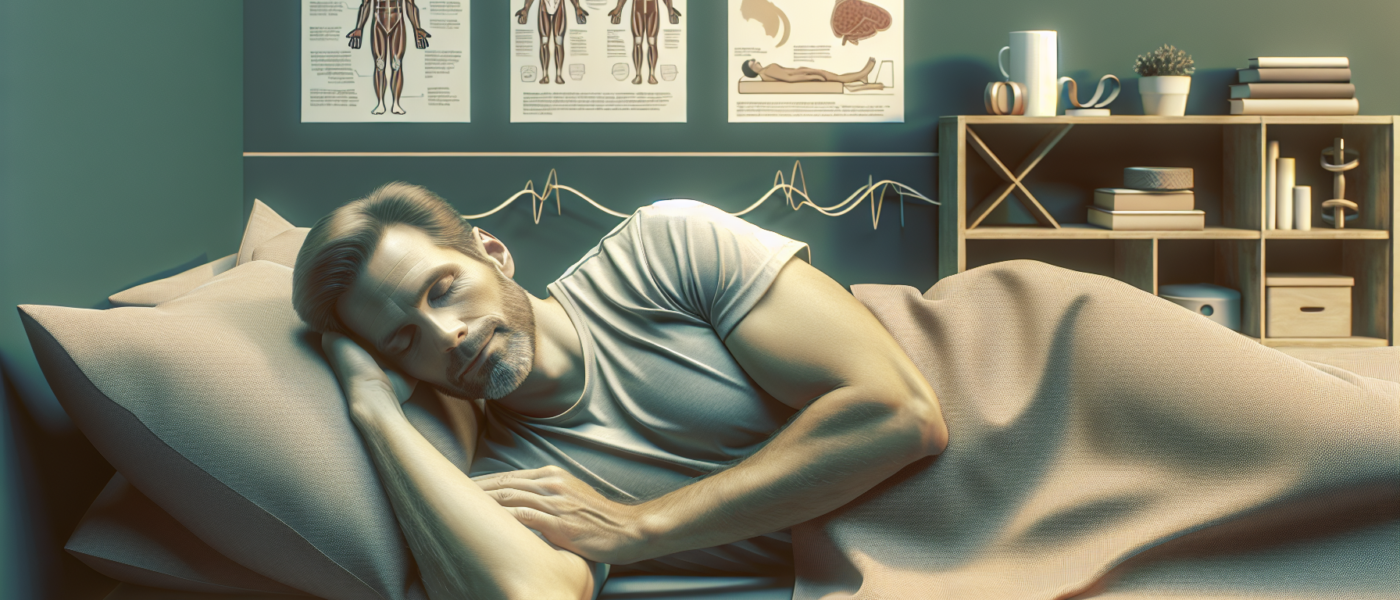The Role of Physical Therapy in Improving Sleep for Men 50+
Key Takeaways
Physical therapy can play a pivotal role in improving sleep patterns for men aged 50 and above. Through targeted exercises, pain management strategies, and lifestyle modifications, physical therapy aids in enhancing sleep quality, addressing sleep disorders, and improving overall physical health.
Introduction
As men age, they often encounter a variety of health challenges, one of which is a decline in sleep quality. Sleep disturbances affect not only mental and emotional well-being but also physical health. For men over 50, addressing these sleep issues is crucial for maintaining overall health. Physical therapy is a holistic treatment approach that can significantly contribute to improved sleep patterns and overall well-being in this demographic.
Understanding Sleep Issues in Aging Men
Men over 50 often face numerous sleep-related problems such as insomnia, sleep apnea, restless legs syndrome, and frequent nocturnal awakenings. The causes can be multifactorial, including hormonal changes, comorbid conditions like arthritis or diabetes, medications, and even stress. These sleep issues, if left unaddressed, can lead to a cascade of other health problems like cardiovascular diseases, cognitive decline, and reduced immune function.
The Link Between Physical Activity and Sleep Quality
There is substantial evidence linking physical activity to improved sleep quality. Regular exercise helps in reducing the time it takes to fall asleep and increasing the duration of deep sleep phases. Physical therapy incorporates specific types of exercises that not only enhance physical fitness but also improve sleep quality. For men over 50, this can be particularly beneficial as it addresses both age-related physical decline and sleep disturbances simultaneously.
Exercise and Sleep
A physical therapist can develop a tailored exercise program that may include aerobic exercises, strength training, and flexibility exercises. These exercises help in regulating circadian rhythms, reducing anxiety and depression, and alleviating symptoms of sleep disorders. For instance, aerobic exercises like walking or swimming can reduce symptoms of insomnia, while strength training can help in alleviating muscle pain that might be disrupting sleep.
Addressing Pain and Discomfort
Chronic pain from conditions such as arthritis or back problems is a common issue among men over 50 and significantly impacts sleep quality. Physical therapy offers several pain management strategies that can help. Through techniques such as manual therapy, stretching, and strengthening exercises, physical therapists aim to reduce pain and discomfort, thereby improving sleep.
Manual Therapy
Manual therapy involves hands-on techniques to manipulate muscles and joints to relieve pain and improve mobility. Techniques such as massage, mobilization, and myofascial release can help in reducing muscle tension and pain, making it easier for individuals to get a good night’s sleep.
Stretching and Strengthening
Targeted stretching exercises can help in loosening tight muscles and alleviating discomfort, while strengthening exercises can support joints and improve overall body mechanics. These exercises can be particularly useful for individuals suffering from back pain or arthritis, common conditions that can disrupt sleep.
Relaxation Techniques
Physical therapy often incorporates various relaxation techniques that can help men over 50 manage stress and anxiety, which are common contributors to poor sleep quality. Techniques such as deep breathing exercises, progressive muscle relaxation, and guided imagery can be highly effective.
Deep Breathing Exercises
Deep breathing exercises involve taking slow, deep breaths to promote relaxation and decrease stress levels. This practice can help in lowering heart rate and promoting a state of calm that is conducive to better sleep.
Progressive Muscle Relaxation
Progressive muscle relaxation involves tensing and then slowly relaxing different muscle groups in the body. This technique helps in releasing built-up tension and promotes overall relaxation, which can positively impact sleep.
Posture and Sleep Positions
Proper posture and sleep positions are often overlooked but are crucial aspects of good sleep hygiene. A physical therapist can provide guidance on optimal sleep positions and postural corrections that can alleviate discomfort and improve sleep quality.
Optimal Sleep Positions
Sleep position can significantly impact sleep quality and physical well-being. Physical therapists can recommend specific sleep positions and the use of supportive pillows to reduce strain on the back, neck, and joints, thereby promoting a better night’s sleep.
Postural Corrections
Good posture throughout the day can also contribute to better sleep at night. Physical therapists can teach and reinforce proper posture techniques that individuals can practice daily, reducing the risk of discomfort and pain that can interfere with sleep.
Lifestyle and Behavioral Modifications
Physical therapy is not just limited to exercises and manual techniques; it also involves educating individuals about making lifestyle and behavioral changes that can improve sleep quality. Simple changes in daily habits can make a significant difference in sleep patterns.
Sleep Environment
A conducive sleep environment is crucial for quality sleep. Physical therapists can provide recommendations on how to optimize the sleep environment, such as keeping the bedroom cool, dark, and quiet, and selecting a comfortable mattress and pillows.
Sleep Hygiene Practices
Good sleep hygiene practices can significantly improve sleep quality. Physical therapists can educate individuals on maintaining a consistent sleep schedule, limiting caffeine and alcohol intake, and avoiding electronic devices before bedtime.
Conclusion
Physical therapy offers a comprehensive approach to improving sleep quality for men aged 50 and above. Through targeted exercises, pain management techniques, relaxation methods, and lifestyle modifications, physical therapy can address the various factors that contribute to sleep disturbances. By incorporating physical therapy into their routine, men over 50 can enhance their sleep patterns, thereby improving their overall health and quality of life.

